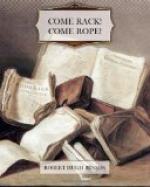He was smiling himself, though his eyes were full of tears, by the time that he had done giving his blessings. Mr. John FitzHerbert was come up from Padley, where he lived now for short times together, greyer than ever, but with the same resolute face. Mistress Alice Babington was there, still serene looking, but with a new sorrow in her eyes; and, clinging to her, a thin, pale girl all in black, who only two months before had lost both daughter and husband; for the child had died scarcely a week or two before her father, Anthony Babington, had died miserably on the gallows near St. Giles’ Fields, where he had so often met his friends after dark. It was a ghastly tale, told in fragments to Robin here and there during his journeyings by men in taverns, before whom he must keep a brave face. And a few farmers were there, old Mr. Merton among them, come in to welcome the son of the Squire of Matstead, returned under a feigned name, unknown even to his father, and there, too, was honest Dick Sampson, come up from Dethick to see his old master. So here, in the hall he knew so well, himself splashed with red marl from ankle to shoulder, still cloaked and spurred, one by one these knelt before him, beginning with Marjorie herself, and ending with the youngest farm-boy, who breathed heavily as he knelt down and got up round-eyed and staring.
“And his Reverence will hear confessions,” proclaimed Marjorie to the multitude, “at eight o’clock to-night; and he will say mass and give holy communion at six o’clock to-morrow morning.”
II
He had to hear that night, after supper, and before he went to keep his engagement in the chapel-room, the entire news of the county; and, in his turn, to tell his own adventures. The company sat together before the great hall-fire, to take the dessert, since there would have been no room in the parlour for all who wished to hear. (He heard the tale of Mr. Thomas FitzHerbert, traitor, apostate and sworn man of her Grace, later, when he had come down again from the chapel-room, and the servants had gone.) But now it was of less tragic matters, and more triumphant, that




